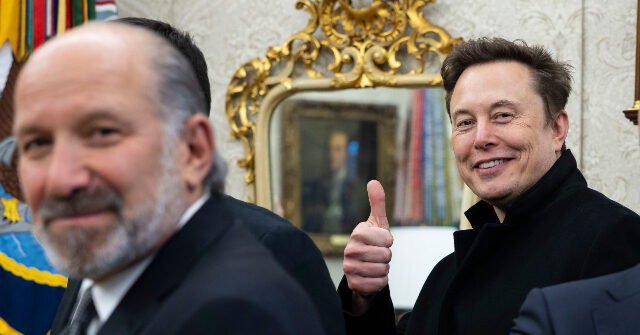Time magazine published its list of 100 most influential people on Thursday, which it described as highlighting “the individuals who are transforming the world” at a time in history during which “almost everything was shifting.”
The list featured seven heads of state, President Donald Trump among them, and five members of his administration, in addition to some of the world’s most influential political figures. Notably absent this year, however, was the influence of China — genocidal dictator Xi Jinping was not listed as “most influential,” nor was anyone close to him in the Communist Party — and the influence of figures surrounding the Russian invasion of Ukraine. Neither Ukrainian President Volodymyr Zelensky nor Russian strongman Vladimir Putin appeared on the list, while two presidents in Latin America and one each representing the Middle East, Africa, and south Asia did. Also notably present on the list is Tedros Adhanom Ghebreyesus, the director-general of the World Health Organization (W.H.O.) which reportedly finalized a draft pandemic accord this week.
The 2025 Time 100 List featured seven heads of government around the world in its “leaders” category: Trump, Mexican President Claudia Sheinbaum, Argentina President Javier Milei, British Prime Minister Keir Starmer, Syria’s jihadist overlord Ahmed al-Sharaa, caretaker leader of Bangladesh Muhammad Yunus, and President of Botswana Duma Boko. The list also included Friedrich Merz, the leader of Germany’s Christian Democratic Union (CDU) and considered a likely candidate for next chancellor of the country.
Trump was one of six individuals in his administration to appear on the list. Editor-in-Chief Sam Jacobs, explaining the decision to include them, noted it was “the largest contingent from a political Administration since Barack Obama arrived in Washington in 2009, a recognition of where global disruption originates today.” Jacobs also claimed that the world is enduring a “leadership void” rapidly being filled by corporate CEOs — a record number of them appearing on the list today.
In addition to Trump, Time recognized Vice President JD Vance, green energy personality Elon Musk, Secretary of Commerce Howard Lutnick, Health and Human Services Secretary Robert F. Kennedy, Jr., and Office of Management and Budget (OMB) Director Russel Vought. Time did not recognize any women or non-white members of Trump’s diverse cabinet, including but not limited to Secretary of State Marco Rubio, Director of National Intelligence Tulsi Gabbard, or Homeland Security Secretary Kristi Noem.
The recognition was not necessarily positive. Writing about Trump, Time correspondent Brian Bennett described him as “forcefully” taking the reins of the office of the presidency” and bringing America to the point of breaking.
“When he hasn’t been trying to steer American culture to the right by pressuring companies and universities to shut down diversity programs, he’s rattling U.S. allies by threatening to invade Greenland and end U.S. support for Ukraine,” Bennett observed derisively.
Similarly, Time accused Vought of spearheading efforts to “dramatically downsiz[e] the federal bureaucracy and demoraliz[e] career civil servants,” while Kennedy, it noted ominously, “believes that parents should choose whether to immunize their children, which contradicts the science behind population immunity.” The magazine was less negative towards Lutnick, whom it blamed for Trump’s “maximalist approach on tariffs” but nonetheless recognized as a “Wall Street power player.”
Vice President Vance, the magazine similarly acknowledged, “has political know-how and a compelling story,” and was turning, it predicted, “what was a political death sentence for his predecessor, Mike Pence, into a position of power, and potential.”
Due to his various business interests, Musk has appeared on the Time 100 list in the past. His 2025 profile was far more positive than past editions, describing him enjoying a “meteoric rise” in wealth and possessing allegedly productive “bouts of frenetic energy.” In contrast, the magazine described Musk in 2023 as “the world’s richest online troll” fresh off his purchase of the social media site Twitter at the time.
The 2024 list appeared significantly more affected by the political moves of Russia and China. At the top of the “Leaders” list then was Yulia Navalnaya, widow of Russian dissident Alexei Navalny, who the Russian government claimed died of “sudden death syndrome” at a prison camp. Former Vice President Kamala Harris, writing Navalnaya’s profile, began: “This February, I spoke at the Munich Security Conference about the Biden-Harris Administration’s commitment to stand for democratic values and against authoritarianism.”
While Xi himself did not appear on the list, his handpicked premier, Li Qiang, made the cut in 2024. Time observed that, prior to being plucked into the number two position in China, Li was famous for enacting “brutal COVID-19 lockdown measures [that] left millions traumatized, shredding his hard-earned reputation as progressive and pro-business.” Also representing China, Time recognized Wang Chuanfu, the CEO of electric vehicle company BYD threatening to destroy Tesla’s ambitions.
The Ukrainian First Lady Zelenska appeared on the 2023 edition of the Time 100 list, profiled by America’s then-First Lady Jill Biden. Biden himself also appeared on the list, as did Wall Street Journal journalist Evan Gershkovich, who at the time was languishing in a Russian prison on dubious charges of espionage.
Time also honored Peng Lifa, a man identified as the dissident who hung an anti-communist banner in Beijing that arguably triggered the widespread protests in China in late 2022. Peng, honored as “Bridge Man,” was swiftly disappeared into the communist “justice” system, his current fate unknown. Some reports indicate that the communist regime also arrested and disappeared some of his family.
Follow Frances Martel on Facebook and Twitter.
Read the full article here


